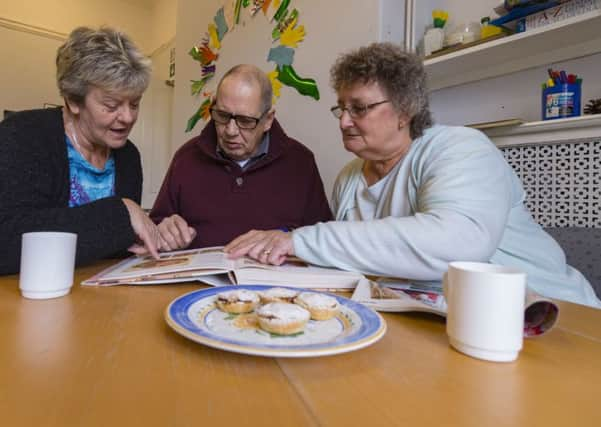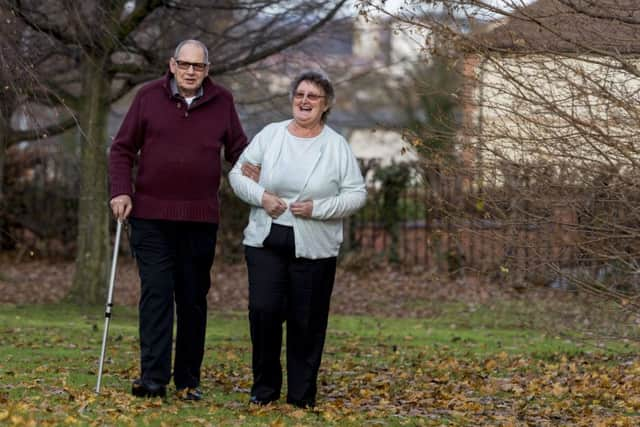My battle with dementia


In November, dementia overtook heart disease as the leading cause of death in England and Wales. According to figures from the Office for National Statistics (ONS), more than 61,000 people died of dementia last year – which equates to 11.6 per cent of all recorded deaths.
The change is largely down to the fact that we have an ageing population. More people are living longer and deaths from some other causes, like heart disease, have gone down. Also, doctors have become better at diagnosing dementia and the condition is now given more emphasis on death certificates.
Advertisement
Hide AdAdvertisement
Hide AdNevertheless, it was a significant moment and a stark reminder that currently “no-one survives a diagnosis of dementia”, as Hilary Evans, chief executive of Alzheimer’s Research UK, said recently.


At the same time, though, dementia is not an inevitable part of ageing. It’s caused by diseases that can be fought through research and finding a breakthrough in this battle has arguably become the greatest medical challenge of our age.
But what is it like for those living with the condition and their families?
Brian Robinson was diagnosed with frontotemporal dementia in 2013. This is a relatively uncommon form of dementia and is triggered by damage to the frontal lobe of the brain, but it’s a significant cause of dementia in younger people, with most people diagnosed between the ages of 45 and 65.
Advertisement
Hide AdAdvertisement
Hide AdBrian, from Leeds, was in his early 60s when he was given the devastating news that he was suffering from the disease. Since then his physical health has declined, his speech is a little slurred and he has problems with his short-term memory.


His wife Pauline says she first became alarmed after he passed out a couple of times on their sofa at home. She became increasingly concerned when one morning he had no recollection of getting to work.
“On this particular day he went to work, which usually took him 20 minutes but this time he couldn’t remember leaving the house and getting to the school where he worked as a cleaner. Then he went wandering off and they brought him home.”
It precipitated a worrying decline in his health. “His memory went and he started forgetting things so we went to the doctors and they sent him for MRI scans and that’s when he was diagnosed with dementia. It was a shock to us both and we cried a bit,” she says. “But we got through it,” adds Brian, tenderly.
Advertisement
Hide AdAdvertisement
Hide AdThe initial weeks and months after being told the devastating news was hard on them both. “I didn’t lose my dignity but it meant I couldn’t drive and to start with I wouldn’t go outside because I felt embarrassed. I felt like a failure because if people looked at me they didn’t see anything wrong with me,” says Brian.
“He was a hard-working man and suddenly he had to stop,” says Pauline. “I used to take him into town and I’d say, ‘it’s nothing to be ashamed of you’ve got to walk with your head up because there are lots of people with dementia.’”
They put on a brave face but at times it’s been an uphill struggle. “We just keep going, but he does forget things. The other night he got up and I said ‘where are you going?’ And he said ‘I’ve got to wash the pots’ and the next second he’d totally forgotten what he was doing.”
We are sat in a sunlit room at Armley Grange, a specialist day centre run by the Alzheimer’s Society in Leeds which offers a community support service for younger people with dementia, including some still in their 40s.
Advertisement
Hide AdAdvertisement
Hide AdBrian comes to the day centre four times a week though he still lives at home with Pauline. He sometimes gets stuck on words but he’s still lucid and dementia hasn’t been able to cloud over his sunny disposition.
He’s been coming to Armley Grange for 18 months and says it’s made a big difference to him. “Wherever I’ve gone I’ve always tried to make people laugh and what I like about it here is you can have a laugh and a joke. And if you ever get upset they’ll have a little talk with you and you feel 10 times better.
“The staff here are wonderful. Here they treat you like a human being. They class everyone the same they don’t just put you in a corner, they encourage you to do things.”
Since coming here he’s taken up drawing, something he hadn’t done before. “I’ve started doing art and they’ve put some of my artwork on the walls. I’m not great, but I’m learning and I enjoy it.”
Advertisement
Hide AdAdvertisement
Hide AdThe staff at the centre encourage Brian and other dementia sufferers to take part in activities. They play dominoes and cards and there’s a jukebox, too. “I like my music, especially the 50s and 60s stuff, and we have sing-songs and it’s great fun, they call me ‘the DJ,’” he says, laughing.
In the summer months Brian does a spot of gardening (he’s growing potatoes) or he might join one of the day trips organised by the centre to a local museum, or park.
There are dark times, too, and after 43 years together this is not the retirement that Brian, who turned 66 last month, and Pauline would have wanted.
But their bravery, love and stoicism is an example to us all. “When you get any diagnosis you go through certain emotions, first of all it’s denial then anger and then acceptance. The first six months were hard but when you feel supported you feel like you can move on,” says Pauline.
Advertisement
Hide AdAdvertisement
Hide AdTogether they, along with their daughter, as well as friends and the staff at Armley Grange, bring light to what is a dreadful situation. “I know I’m not going to get any better but I’ve gone through my pain,” says Brian. “I’m expecting to get worse, but I’ve got my family, what I call my little bubble.”
There are few words in the English language that strike such fear in people as ‘dementia’ does. And with good reason. It is a harrowing condition, one that can rob people of their character while their families face the anguish of watching the person they love slowly disappear in front of them.
But at the same time there is support out there and in research centres up and down the country scientists are busy trying to halt the progress of this remorseless condition and one day, hopefully, stop it altogether.
What people like Brian and Pauline offer is a message of hope. “Once you get over the fact someone has dementia you find a way of coping. Brian does still do things, he’s not just withering away.”
Advertisement
Hide AdAdvertisement
Hide AdHe nods in agreement. “When I was first diagnosed I sat in the corner and thought ‘that’s it’. I was frightened. But now I’d say to people who have been diagnosed with dementia ‘don’t be frightened, there is light at the end of the tunnel.
“You might be a bit slow but you’ve still got a brain, you’re not useless. And you’re not on your own, there is support out there... and once you realise that, that’s when you start living.”
Dementia in numbers
According to research by the Alzheimer’s Society more than 850,000 people in the UK have dementia.
It is estimated that 225,000 people will develop dementia this year, that’s one every three minutes.
Advertisement
Hide AdAdvertisement
Hide AdAt present, one in six people over the age of 80 have dementia.
Alzheimer’s disease accounts for 62 per cent of dementia cases.
Up to a quarter of hospital beds are occupied by people with dementia at any one time.
Two-thirds of the cost of dementia is paid by people with dementia and their families.
If anyone has any concerns about dementia they can go to alzheimers.org.uk to find their local branch or call the national helpline number which is 0300 222 11 22.